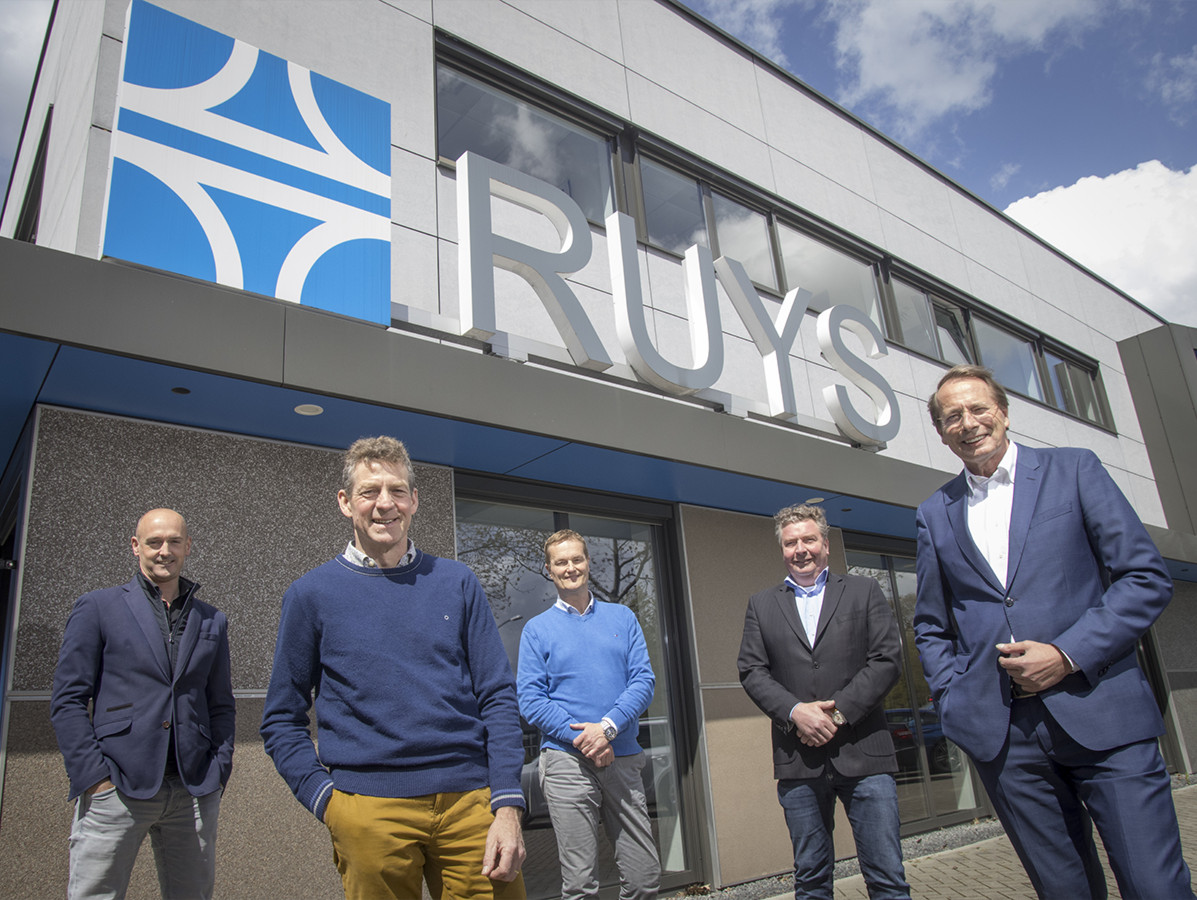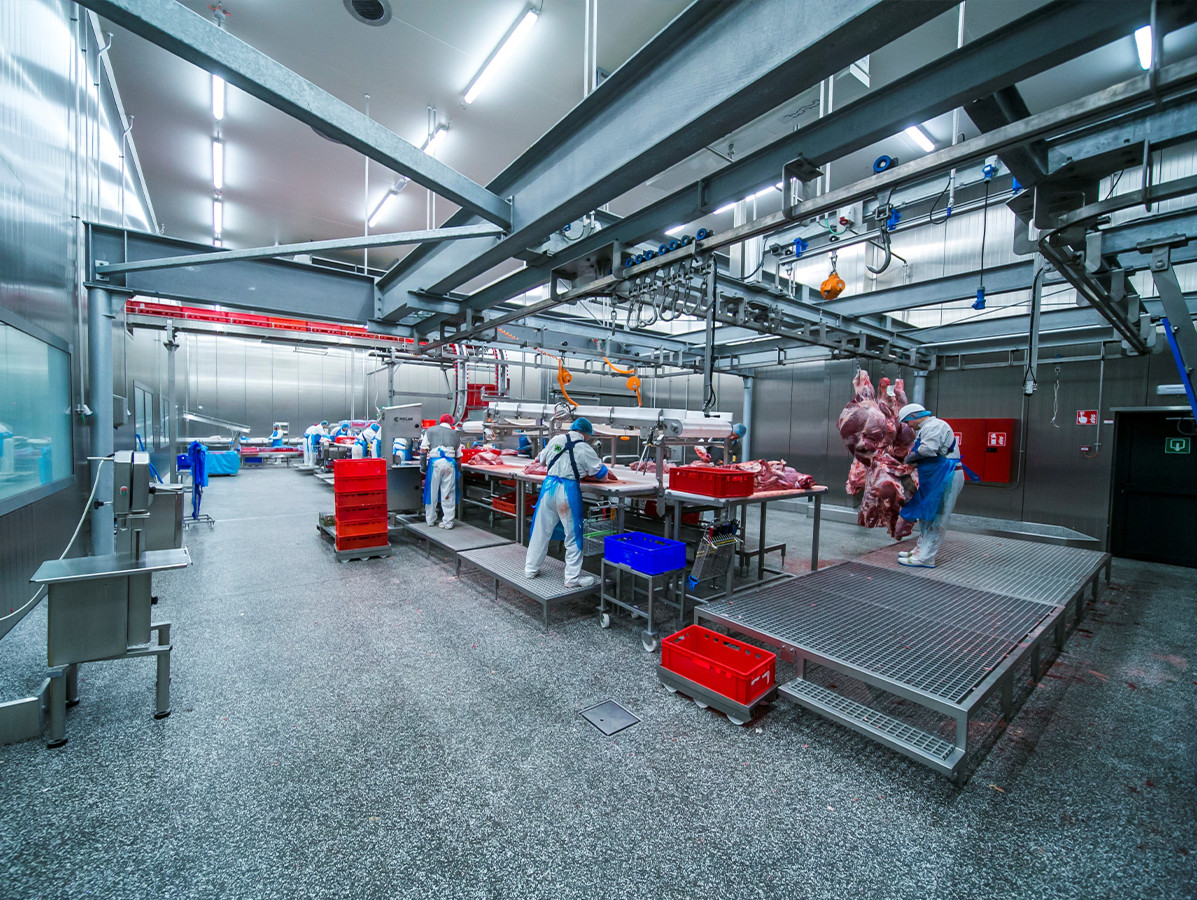
The production floor has to endure a lot. It has to be able to take a beating and meet various requirements with regard to the product and the personnel. "The food industry is the most critical place for industrial floors", says director Hendrik Ruys of flooring supplier Ruys Group.
A large gutter? It can be an obstacle for robotic pallet trucks and cause them to malfunction. The choice to pre-cook a food product has consequences for the environment. And what about the new machine? The knowledge that the top layers of some floors loosen when exposed to temperatures above 60 degrees Celsius makes the question of how hot the waste water is a highly relevant one. These are just some points that may not be top of mind, but are very essential. Every business process affects (the choice of) a floor.
Just like the food industry has to deal with different requirements, industrial floors also have to have a wide range of properties. A lot is asked of them. "Those who process meat or fish, for example, operate at a low temperature because of the shelf life of the product. At the same time, the floor is cleaned with very hot water. There are often forklift trucks driving around. Employees must be able to do their work safely and comfortably. There shouldn't be a sharp corner or a puddle on the floor. In addition, factors such as wear resistance and durability are very important," says Hendrik Ruys. It's a complex matter, but the kind of challenges that 'his' Ruys Group knows how to deal with. Meanwhile, the Apeldoorn-based company has been supplying industrial floors to companies at home and abroad for more than 45 years. In various branches, of which food forms a large part. Many metres of Ruys floors can be found at meal producer Huuskes, for example. "The fact that Ruys can carry out the project completely, including the gradient and the various top layers together with the bumper strips, gives us advantages in terms of coordination and planning," says Frank Hagmolen, Head of Technical Services at Huuskes.
It is an example of what distinguishes the group, according to Hendrik: the total solution. By taking responsibility for the entire process -from design and development to maintenance-, the client is prevented from falling between two stools. A choice of floor for one space can cause problems elsewhere, because: not only factors such as the load on the floor play a role. How the (logistic) routes run in the company is also important. And what the best location is for drains, wells and gutters. Ruys likes to be involved in a project from the start. The flooring supplier works together with Architectenbureau Bessels, among others. "Our experience in 30 years of designing and engineering food factories is that Ruys is one of the few who can look at complex flooring issues with a helicopter view. The most important thing about a floor is not the day it is delivered, but what it will look like after five, ten and fifteen years of use. Ruys scores well in that respect," says architect Herman Bessels.

In order to find a solution to every company floor problem, the company relies on its own total range of company floors and wall protection. The exclusive MARGIA GRANIET floor is suitable for heavy mechanical loads with high anti-slip requirements and is often found in the meat and vegetable industries. Its little brother MARGIA CRETE is an example of a floor with the appearance of the MARGIA GRANIET floor and the thermal and chemical properties of the Ucrete floor (of which Ruys is a Preferred Applicator) and is used in bakeries and the meat, fruit and dairy industry. This is just a small selection of the floors that the Ruys Group owns.
The Ruys Group has experienced considerable growth since it was founded in the 1970s. "This is largely due to listening carefully to the client and responding to their needs", says Hendrik. "We have grown together with our customers. When we set up the plastic division about ten years ago, we expanded the range of floors we could offer, and we can now also provide the general areas with a suitable floor. If a large meat producer started a meat product line with a slaughterhouse floor from us, we developed a suitable floor for that too. Because of the high demand for floor renovation, we established a specialised company in our Ruys Group. We continue to respond to developments such as robotisation and automation of business processes and the growth of the renovation market. In addition, we see that companies are more often building their production areas on higher floors. Fortunately, we are learning from our projects abroad, where this trend has been going on for some time. It brings with it other requirements. But that is not a problem. The higher the requirements, the more our floors come into their own."
Main photo: from left to right: Bjorn van der Borst (commercial manager Ruys Vloeren), Jean-Claude de Maaijer (manager MR Vloeren), Edwin Slingerland (director SR Vloeren), Hein Steeman (company director De Bedrijfsvloer), Hendrik Ruys (director Ruys Groep)
Strong together
The Ruys Group consists of Ruys Vloeren for new building and maintenance, SR Vloeren for service and renovation, De Bedrijfsvloer for synthetic industrial floors and Ruys Handelsmij for the supply of stainless steel wall protection and drainage systems. The Belgian market is served by MR Vloeren, which was founded at the beginning of 2021. In May, it was joined by AS Vloerwerken, which offers floor solutions for public spaces. They operate independently, but are coordinated centrally. "This way we offer the customer a total solution for every floor problem as one party," says Hendrik.
Photo: © Koos Groenewold
Source: Vakblad Voedingsindustrie 2021